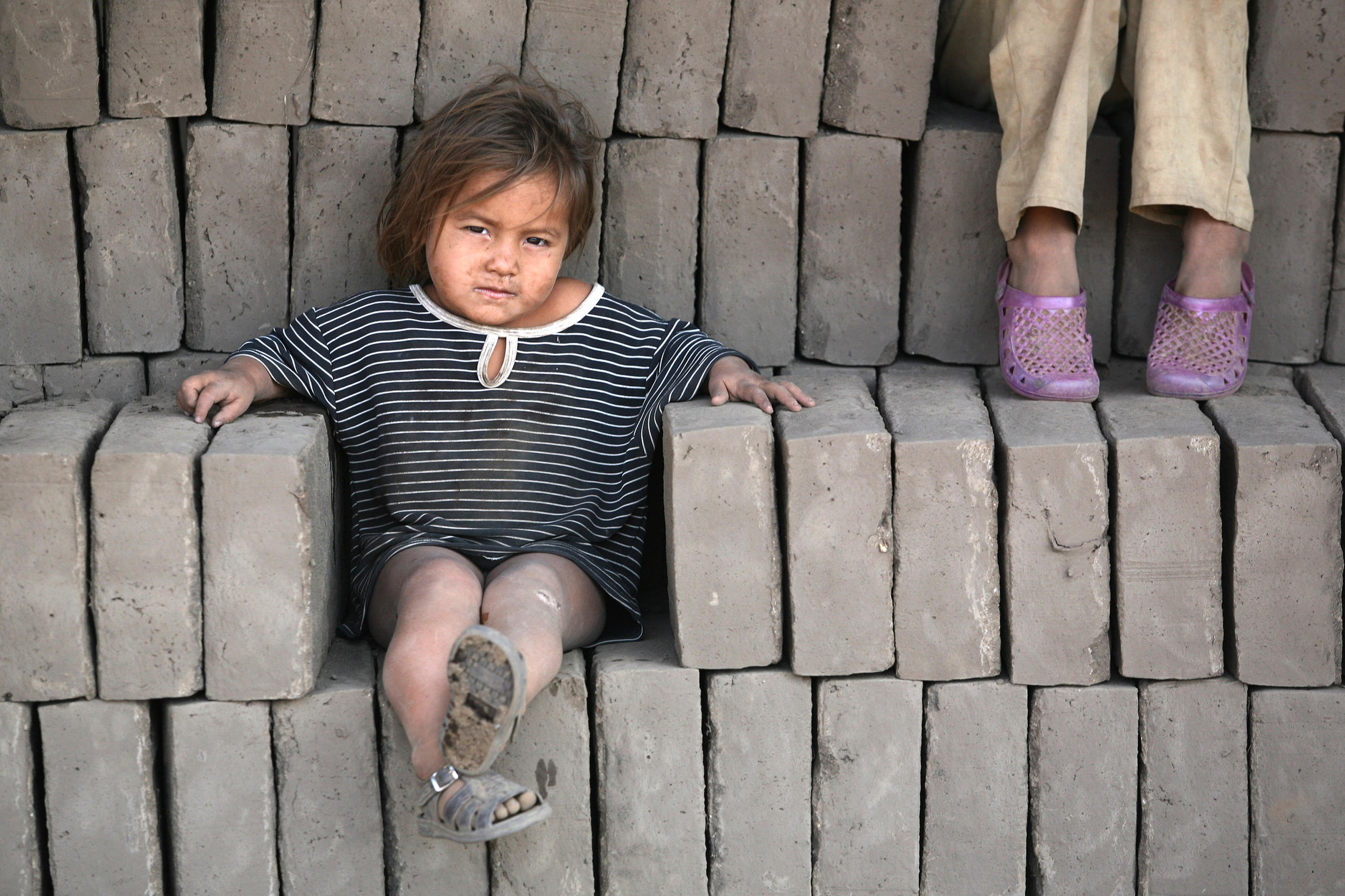
A ‘revolution’ in how we see the rights of children

Thirty years ago, the United Nations Convention on the Rights of the Child presented its take on juvenile justice: a child is the best judge of his or her situation. The treatyExternal link was a relatively easy one for the international community to rally behind. It has been signed by 196 states.
Lawyer Jean Zermatten was the first Swiss to sit on the UN’s Committee on the Rights of the ChildExternal link (CRC) and later became its president. In an interview with swissinfo.ch, Zermatten shares some of the moments and insights that helped shape a career devoted to the cause.
swissinfo.ch: Throughout your long career working on child rights, which issue most moved you?
Jean Zermatten: One situation in particular physically paralysed me, a visit to a prison in Nicaragua. Forty-three children were crammed into a cell of 43 square metres. The building was covered by a corrugated roof and there were just two barred windows.
The heat was suffocating and the smell was unbearable. There was neither water nor toilets, and the children just had a hook fixed to the ceiling, like in a butcher’s shop, from which to hang their things. The noise was hellish. It was horrendous.
After leaving, I couldn’t speak for the whole day. I could open my mouth, but nothing came out. It was a physical manifestation of the shock. Thankfully, after this, I managed to contact government representatives and convince them to close the prison.

Jean Zermatten
Born in 1948, Jean Zermatten spent his entire career working for the rights of children. After studying law, he spent eight years at the penal children’s court in Fribourg. In 1980, he founded the court for minors in Valais, where he worked as a judge for 25 years.
In parallel, he worked for children’s rights internationally and was the founder and director of the International Institute for the Rights of the ChildExternal link. In 2005, he was the first Swiss to be elected to the UN Committee on the Rights of the Child. He later became president of the body.
swissinfo.ch: How has the UN Convention on the Rights of the Child improved the situation of minors?
J.Z.: The big revolution of the Convention was that children were now considered as people. They are human beings who enjoy rights from birth. Whereas before, we offered them protection, now they have a right to it, and can demand it if it is lacking.
The key to this system is to determine the best interests of children by giving them a voice. Securing this principle was my most important battle. Nevertheless, we still all too often start with the idea that we know what is best for children: a paternalist attitude, full of good intentions, which must change.
swissinfo.ch: When a state ratifies a convention, how is it implemented?
J.Z.: Ratifying is just the start of a long and difficult road. The state’s entire legislative system needs to be adapted to be compatible with the convention. Various areas are impacted: education, health, protection, culture. Sometimes new laws are needed. Quite a few countries, upon signing the treaty, didn’t realise the extent of the engagement they’d taken on. It’s an ongoing process that probably doesn’t have an end point.
swissinfo.ch: Does the digital age raise new challenges for child rights?
J.Z: On one hand, the Internet is an extraordinary tool for promoting children’s rights throughout the world. On the other hand, new threats have appeared, notably sexual predators operating online, or the spread of child pornography.
Problems for the protection of one’s private life also come up here. The simple posting of photographs of your children on social networks needs to be controlled. Some images, even when posted by well-intentioned parents, could constitute a breach of privacy.
The CRC is therefore in the process of drafting a “general observation” [a recommendation for states] on child rights in the digital age.
swissinfo.ch: Switzerland signed the treaty rather late, in 1997. Are there areas where the country still needs to make progress?
J.Z.: Switzerland is neither a problematic nor a model pupil. For example, the treatment of unaccompanied refugee minors is not sufficient. They are assigned a tutor who they see just once upon arrival; they should receive continued support.
Also, in certain cantons, child refugees are still placed in administrative detention. Considering children as criminals, and then denying them freedom because they are migrants, is serious. This practice must be stopped.
The inclusive education of handicapped children, rare if not non-existent in Switzerland, is another problem.
swissinfo.ch: What steps should federal authorities take?
J.Z.: Switzerland should adopt a coordinated federal policy on child rights that could – among other things – do more to tackle violence and abuse. Currently, each canton does as it likes. The country also lacks a national institution dedicated to children’s rights, whose mandate could be to promote, identify gaps in protection, and look into individual complaints from children. The government is planning to create a body that would look after human rights in their entirety, giving it a budget of CHF1 million ($1.01 million). With that, you can’t do anything.
swissinfo.ch: As a member, then president, of the UN Committee on the Rights of the Child, do you feel that you have managed to do your bit in the building of this system?
J.Z.: I would not say that I have moved mountains, but I have helped to lay some bricks. Under my presidency, the CRC adopted a protocol that allows children who have suffered abuse to make a complaint to the committee, once they have exhausted the legal options in their own country. This instrument makes child rights more effective, since beforehand we only had the possibility of publishing recommendations or pushing an issue into the media.
swissinfo.ch: Are you frustrated by any issue in particular?
J.Z.: The treatment of handicapped children in underdeveloped countries shocked me hugely. They are completely neglected, left with their family or at the mercy of the community’s goodwill. It’s difficult to take action on this, because the problem is general and concerns many countries where social services simply don’t exist. Also, the attitude of authorities is generally to say that such things are a curse from the sky. My biggest frustrations come when politicians are fatalistic, or talk about divine punishment.
swissinfo.ch: What would you wish for children today?
I wish them the right to be able to be children: to play, enjoy cultural activities, receive an education. In some countries, playing is not possible, simply because you risk setting off a landmine. And there’s no such thing as the right to receive affection from one’s parents – but that would be my greatest wish.
As part of the anniversary celebrations in Switzerland, Interior Minister Alain Berset, addressed a crowd of children on parliament square in the capital, Bern on Wednesday.
He recalled the importance of the Convention of the Rights of the Child, ratified by Switzerland in 1997.
In Geneva, the state secretary in the foreign ministry, Pascale Baeriswyl, said the anniversary was not a day for promises but for action. She said the Swiss government had taken a series of measures to help children in care and those whose parents are detained.
However, the non-governmental Swiss Refugee CouncilExternal link has criticised the protection standards for asylum seeking minors, calling for more suitable housing and for improving the practice of estimating their age in line with international regulations.
Translated from French by Domhnall O’Sullivan, swissinfo.ch

In compliance with the JTI standards
More: SWI swissinfo.ch certified by the Journalism Trust Initiative































You can find an overview of ongoing debates with our journalists here . Please join us!
If you want to start a conversation about a topic raised in this article or want to report factual errors, email us at english@swissinfo.ch.